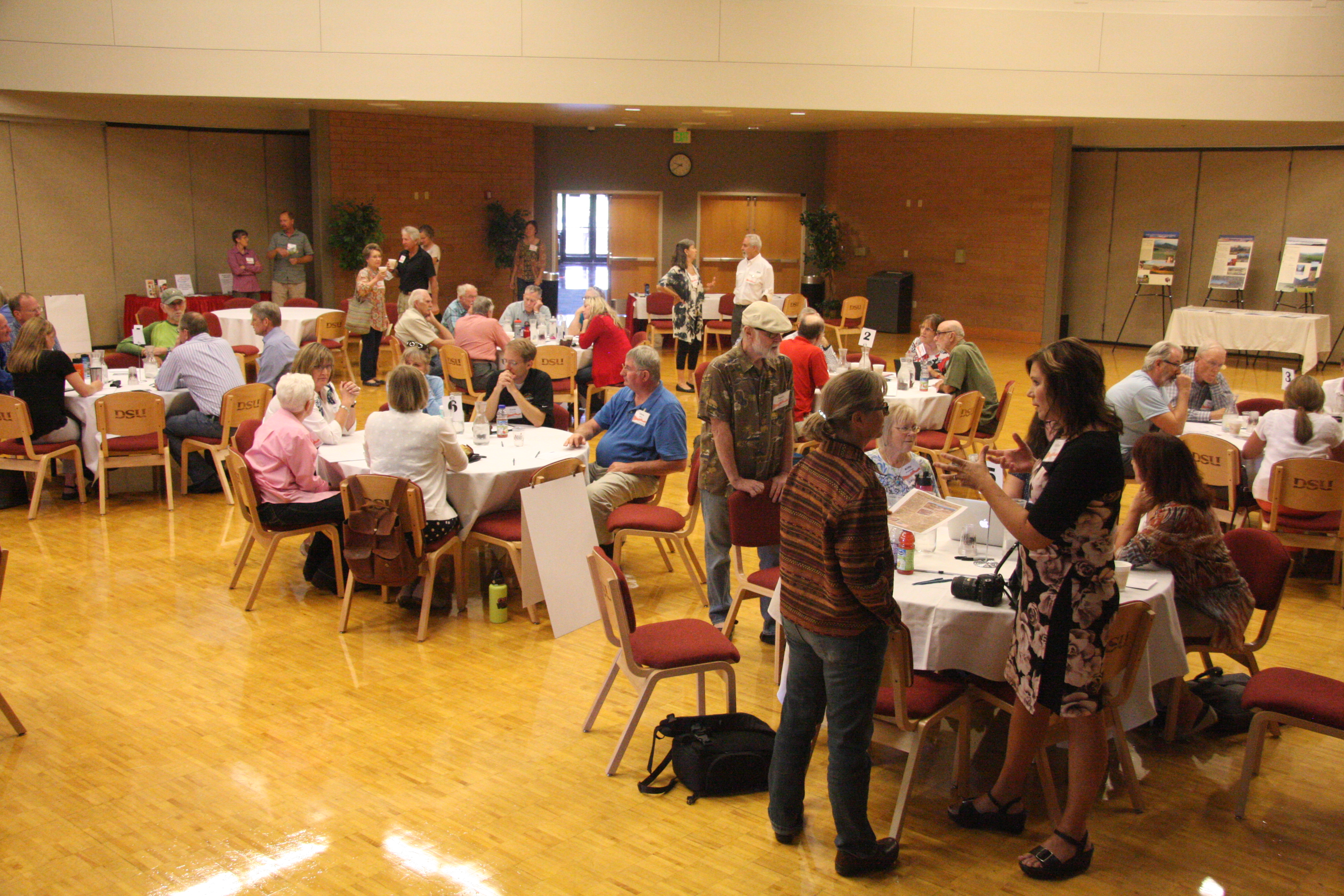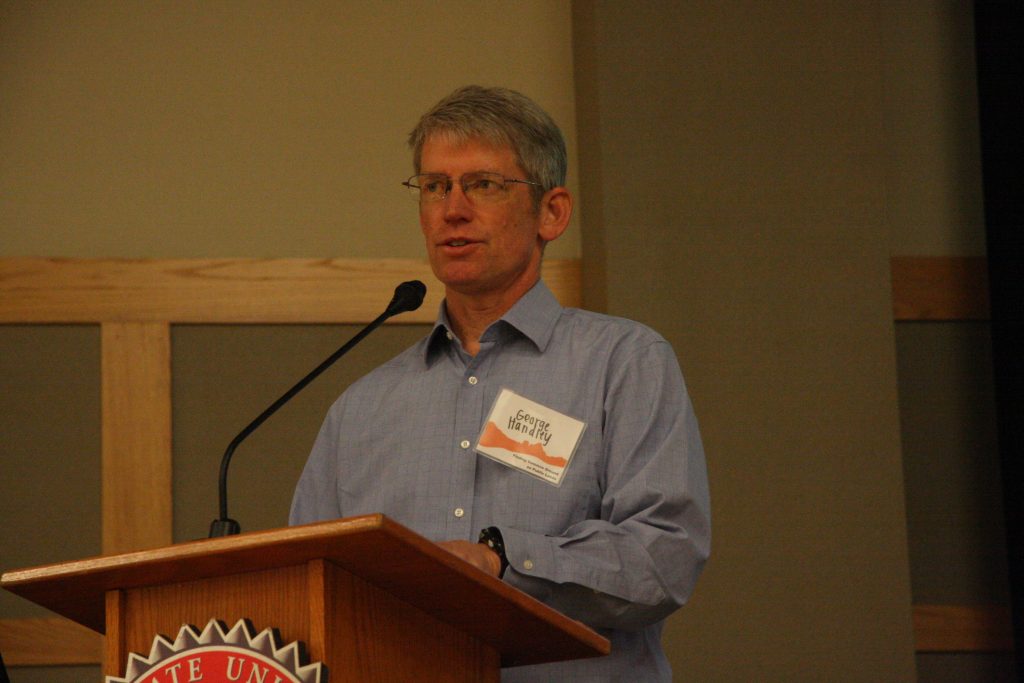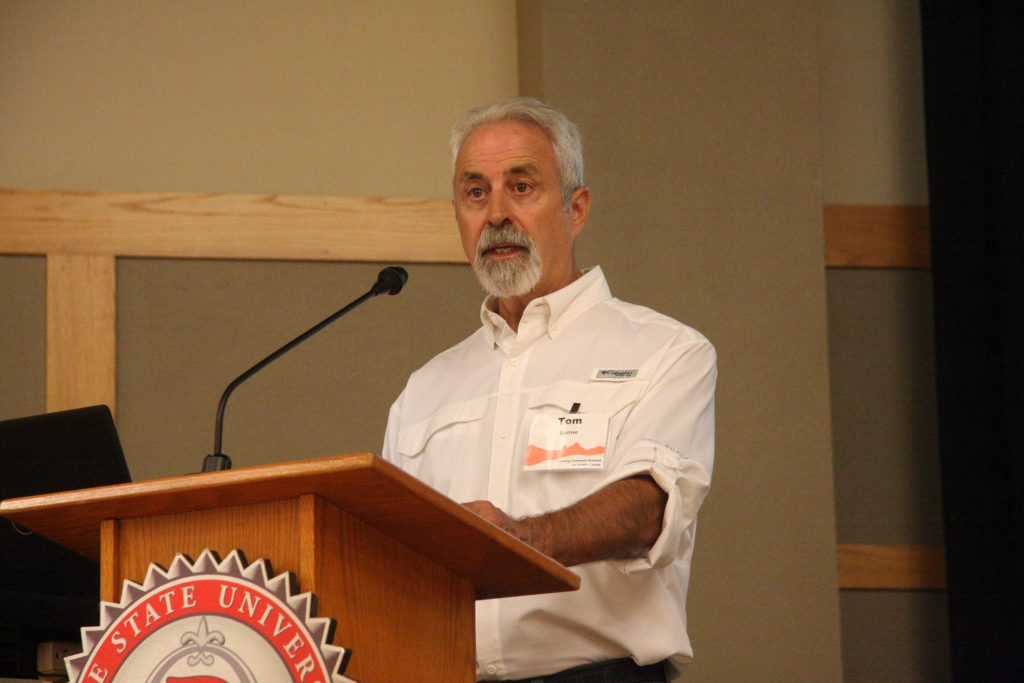
ST. GEORGE — Dozens of people, including many who were strangers to each other, came together to share their values and ideas about public lands in a forum titled “Finding Common Ground on Public Lands.”
The five-hour event, which took place Thursday morning at the Dixie State University Gardner Student Center ballroom, was organized and sponsored by Conserve Southwest Utah and the Dixie State University Sustainability Club.
“We want to understand how we can work together,” Tom Butine, board president of Conserve Southwest Utah, said as he welcomed the approximately 60 people in attendance. The grassroots nonprofit organization advocates conservation of the region’s natural resources.

Butine told the participants the purpose of the forum was to take the next step in a public discourse that started in 2006 and bring together those with diverse points of view and find common values, and to engage in or restart dialogue with elected officials.
The first of two keynote speakers was David Jenkins, president of Conservatives for Responsible Stewardship, a national nonprofit organization.
“Conservative and conservation are both derived from the same root word,” Jenkins said, citing several Republican presidents who either designated national monuments or were instrumental in creating other protections for public lands.
“Environmental stewardship and natural resource conservation are inherently conservative,” he said.
“These public lands collectively belong to all of us. They’re part of our heritage,” Jenkins said. “We all have a great responsibility to be good stewards of (them).”
“Once open space is lost, you almost never get it back,” Jenkins added.
In the question-and-answer session that followed, Jenkins was asked by participant Burle Southard why Jenkins had advocated for the nomination of current U.S. Interior Secretary Ryan Zinke.

“I feel differently about that now,” Jenkins said, noting that he had considered Zinke to be the most principled of the choices at the time, just prior to his nomination by President Donald Trump.
“We probably have a different view, based on what’s happened over the past six months,” Jenkins said.
Other attendees asked whether states would have an incentive to privatize or monetize public lands, and whether better land management could have prevented this summer’s Brian Head forest fire from being such a widespread disaster. The role and purpose of state school trust lands was also briefly discussed.
After Jenkins’ remarks, participants took part in facilitated hour-long roundtable discussions, with each table tasked with trying to identify shared values, along with any differences and the underlying issues associated with them
Afterward, a representative from each of the 11 groups shared their group’s ideas with the rest of the attendees.
Among the key points:
- Most people appear to share a love for the outdoors, though they may choose to experience and enjoy public lands differently. “We all value them in different ways, but they’re still valuable,” one participant said.
- Many agreed that decisions about public lands should ultimately be made at the national (federal) level, but that all stakeholders should have a say in the process, including state, county, city and tribal officials and members of the general public.
- Preservation of the land for future generations was seen as a priority, with a key challenge being how to accommodate economic growth and viability.
- Many attendees also saw the value in finding shared values across the political spectrum. “We decided stewardship of the land should not be a partisan issue,” Washington County Commissioner Dean Cox said, as he presented his table’s ideas.

The event’s concluding keynote speaker was George Handley, a professor of interdisciplinary humanities at Brigham Young University.
“There’s been an explosion of interest in religion and the environment,” Handley said.
“I’m not here to make any argument one way or the other about public lands,” Handley said, instead indicating his preference to explore the underlying theological basis for conservation, using Christian doctrines.
Handley cited a biblical example of stewardship in the book Genesis, which indicates God gave Adam and Eve a directive to “dress, tend and keep” the Garden of Eden. Later, Handley also touched on themes related to creation, the law of consecration and repentance.
Handley also cited a quote from Pope Francis: “The human environment and the natural environment deteriorate together.”
On a related note, Handley said he often wonders what the Mormon pioneers would think if they could see today’s society.
“I think they’d be amazed, or even appalled, at how wasteful we are,” Handley said, adding, “Mormonism teaches restraint and using the excess of one’s resources to give to others.”
“We can’t sustain our level of current consumption of natural resources,” he said.

Nevertheless, he agreed that there are no easy solutions. “Decisions about the environment require a careful consideration of outcomes, case by case,” he said.
As the forum wrapped up, Butine thanked those in attendance, along with Susan Crook and other organizers and the event’s several sponsors. He encouraged the attendees to engage with their elected officials and encourage them to “understand the facts and values framing the foundation of their positions and policies on public lands.”
“We’re hoping this is just the beginning,” Butine said afterward. “The next step is important.”
Resources:
- Conserve Southwest Utah
- Dixie State University Sustainability Club
- Conservatives for Responsible Stewardship
Click on photo to enlarge it, then use your left-right arrow keys to cycle through the gallery.

Event organizer Tom Butine speaks to attendees of a public forum titled “Finding Common Ground on Public Lands" at the Dixie State University Gardner Student Center, St. George, Utah, Sept. 21, 2017 | Photo by Jeff Richards, St. George News

Keynote speaker David Jenkins speaks to attendees of a public forum titled “Finding Common Ground on Public Lands" at the Dixie State University Gardner Student Center, St. George, Utah, Sept. 21, 2017 | Photo by Jeff Richards, St. George News

Washington County Commissioner Dean Cox presents his focus group's ideas during a public forum titled “Finding Common Ground on Public Lands" at the Dixie State University Gardner Student Center, St. George, Utah, Sept. 21, 2017 | Photo by Jeff Richards, St. George News

Keynote speaker George Handley speaks to attendees of a public forum titled “Finding Common Ground on Public Lands" at the Dixie State University Gardner Student Center, St. George, Utah, Sept. 21, 2017 | Photo by Jeff Richards, St. George News
Email: [email protected]
Twitter: @STGnews
Copyright St. George News, SaintGeorgeUtah.com LLC, 2017, all rights reserved.


The funny thing here is “you think” you have a say in waht in going to happen to the southern Utah area over the coming years ahead…..they will build this place to death and cover every inch of land that they can only to fulfill their greed at the cost of your quality of life.
utahdiablo, yes, and that’s why it takes constant vigilance and work to protect this area. In 2006, Citizens for Dixie’s Future – now “Conserve Southwest Utah” – worked diligently to get the Washington County Growth & Conservation Act changed to not allow 25,000 acres of public land to be transferred to Washington County for even more growth. We may not be able to stop the cancerous growth we see within the current county boundaries but pressure to stop them from getting more land to do even worse is important. Will we win again? Who knows with the current administration but if we don’t try and don’t stay committed, we certainly will lost. Keep the faith, baby!